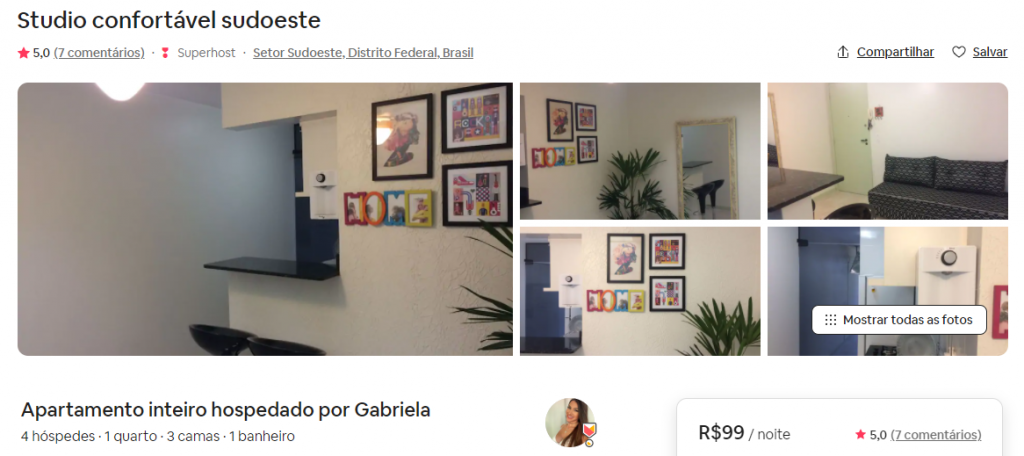Cars by app, bicycle rental and seasonal accommodation.
Surely you have already used one of these services, or at least heard about them, right? These are some examples of a new global trend known as the Sharing Economy.
The new model has been transforming the way people consume goods and services and, thus, revolutionizing the economy. So, if you've never heard about the subject, we're here to tell you why you need to stay up to date right now!
But what is the sharing economy?
The sharing economy is an economic model that allows users to share products and services, through rentals, subscriptions, exchanges and loans. Over the last decade, society has witnessed the rapid growth of this form of economy, which values convenience, allowing the consumer to use a good or service only for as long as it suits them, without the need to purchase it.
According to IDP professor Pedro Nery, "consumers benefit from lower costs and greater choice."
Some of the most popular examples are app-based cars and seasonal home rentals. But, did you know that nowadays it is possible to rent everything from maintenance tools and storage spaces to luxury bags and toys?
Gabriela Koetz is a civil servant and mother of two children. She says that she has already rented several items for her children, such as walkers and playpens, but she also rents toys such as bounce houses and activity centers.
Temporary rental offers financial benefits: "they were items that my children would only use for a short time and were of high value, so the rental was good value for money", explains Gabriela.
Furthermore, she says that she was so satisfied with the experience that she stopped buying items for the possibility of renting them!
The public servant recommends sharing for people in the same situation: "the service allows us to diversify children's toys without having to buy them. Furthermore, it is a form of sustainable consumption", explains Gabriela.
The issue of sustainable consumption really gains relevance. The sharing economy, by promoting the reuse of products, reduces the environmental impact caused by the excessive production of little-used, easily discarded and highly polluting items. Pedro Nery states that "the trend is here to stay, especially in the face of climate change, which will continue to put pressure on traditional forms of consumption."
And, if you doubt the little ones' satisfaction when faced with toys for a limited time, Gabriela guarantees that the experience also brought benefits to her children. "Children quickly get bored with toys and the location allows them to vary their repertoire more", says the public servant. In other words, no more abandoned toys at the back of the closet!
Offering goods or services in the shared model
Shared services applications provide several opportunities for those who want to generate income.
Among the best-known examples are app-based car companies, which allow drivers to register and start receiving an amount for each ride made, providing a source of income. As the service is offered within a platform, part of the amount paid by the consumer goes to the company and the driver keeps the rest.
In this sense, professor Pedro Nery warns that the main challenges of the sharing economy are legal, especially in work relationships.
"Many platforms have benefited workers with employment opportunities, but it is considered that there is precariousness in some cases - such as app drivers", explains the expert. According to the professor, regulating these activities disproportionately can generate costs that consumers are not willing to pay, making the system unviable.
However, other types of applications also offer financial advantages, such as seasonal rentals, which allow owners to offer their spaces to users who wish to stay for a defined period of time. On the platforms, different types of accommodation are offered, such as individual or shared rooms, apartments, houses, flats and kitchenettes, all over the world!
The person who found this service a way to earn extra income was lawyer Gabriela Barbosa, who for around eight months has been renting her studio apartment in Setor Sudoeste, in Brasília, through the Airbnb app. She says that, with seasonal rentals, she achieves greater gains than she would obtain through an annual rental contract, for example .

The lawyer identified the business opportunity after learning that the previous owner was already renting the space: "I found it interesting, so I continued", she explains.
However, some issues must be taken into consideration before offering a property for rent. Expenses such as condominium fees, water bills and electricity bills are the responsibility of the owners, as is all maintenance of the space, including cleaning and changing bed linen.
Gabriela emphasizes that the application "is very educational, easy to use and adds value to my unit as it is a cheap daily rate, so there are always guests".
Opportunity or risk for companies?
“Well-positioned companies can profit, but of course not everyone wins. Those stuck to the previous model could even go bankrupt”, comments Pedro Nery.
The professor highlights that, in a way, from the point of view of progress, it is interesting for the old to give way to the new, freeing up physical and human capital for this new sector that better responds to family demand. “It has a lot to do with what in microeconomics is called 'creative destruction': DVD ended VHS and is now threatened by streaming, and so on”, he comments.
Therefore, it is necessary to be aware of new market patterns: how does this influence my company? How will I position myself? How does it affect the relationship with customers?
Share to be happy?
Pedro Nery explains that the sharing economy trend follows a movement that has always existed. "Cities existed and grew based on the specialization of the economy, with consumers unknowingly joining together to pay for a series of services they didn't realize", explains the economist. This way, it is possible, for example, to keep a restaurant running - using small financing from several people.
Likewise, the advancement of technology brings this movement to other markets, in which there were high transaction costs, such as real estate and automobiles. “But we already shared, for example, books with libraries”, highlights the teacher.
Pedro also highlights that, from a behavioral economics point of view, it makes perfect sense to prioritize experience over product ownership. " Studies show that it is the path to a happier life. Owning goods brings happiness for a short period of our daily lives, just for the time we actually spend with the good in question, like when we drive a new car", says the teacher.
As it allows the consumer to use the product only for the desired time, in addition to enabling greater diversity of consumption, the sharing economy ends up enhancing this feeling of satisfaction!
So, it's very likely that you didn't even know that, through some routine choices, you end up collaborating with this multiple and attractive system, right?
But now, tell us: what types of shared services have you used?








